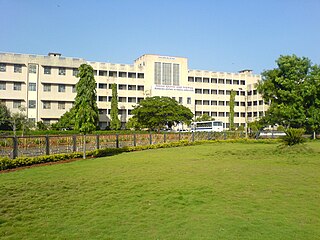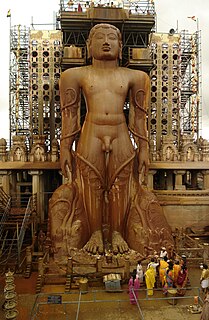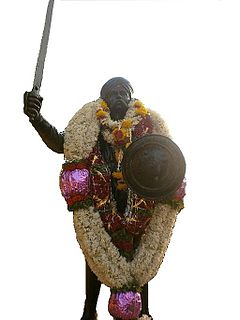
Karnataka is a state in the southwestern region of India. It was formed on 1 November 1956, with the passage of the States Reorganisation Act. Originally known as the State of Mysore, it was renamed Karnataka in 1973. The state corresponds to the Carnatic region. Its capital and largest city is Bangalore.

Havyaka Brahmins are the Hindu Pancha Dravida Vedic Brahmins from the Indian state of Karnataka. Havyakas profess the Advaita philosophy propounded by Adi Shankaracharya. Most Havyakas can trace their immediate ancestry to either Sirsi, Uttara Kannada, Shivamogga, Udupi, Dakshina Kannada or Kodagu districts of Karnataka and Kasaragod district of Kerala.

Dakṣināmnāya Śrī Śāradā Pītham or Śri Śringēri Mutt is one amongst the four cardinal pīthams following the Daśanāmi Sampradaya - the peetham or Matha is said to have been established by acharya Śrī Ādi Śaṅkara to preserve and propagate Sanātana Dharma and Advaita Vedānta, the doctrine of non-dualism. Located in Śringerī in Chikmagalur district in Karnataka, India, it is the Southern Āmnāya Pītham amongst the four Chaturāmnāya Pīthams, with the others being the Dvārakā Śāradā Pītham (Gujarat) in the West, Purī Govardhana Pīṭhaṃ (Odisha) in the East and Badri Jyotishpīṭhaṃ (Uttarakhand) in the North.

Tigalari, also known as Tulu script, is a Southern Brahmic script which was used to write Tulu, Kannada, and Sanskrit languages. It was primarily used for writing Vedic texts in Sanskrit. It evolved from the Grantha script. It is called as Tigalari lipi in Kannada-speaking regions and Tulu speakers call it as Tulu lipi. It bears high similarity and relationship to its sister script Malayalam, which also evolved from the Grantha script.

Sirsi is a moderate city in Uttara Kannada district, Karnataka, India. Sirsi was also known as Kalyanapattana during the Sonda Dynasty.

North Karnataka is a geographical region in Deccan plateau from 300 to 730 metres elevation that constitutes the region of the Karnataka state in India and the region consists of 13 districts. It is drained by the Krishna River and its tributaries the Bhima, Ghataprabha, Malaprabha, and Tungabhadra. North Karnataka lies within the Deccan thorn scrub forests ecoregion, which extends north into eastern Maharashtra.

Dharwad is an administrative district of the state of Karnataka in southern India.
Sodhe also called Sodha, Sonda or Swadi is a village near Sirsi in the Uttara Kannada district of Karnataka in India.

Karnataka, the sixth largest state in India, has been ranked as the third most popular state in the country for tourism in 2014. It is home to 507 of the 3600 centrally protected monuments in India, the largest number after Uttar Pradesh. The State Directorate of Archaeology and Museums protects an additional 752 monuments and another 25,000 monuments are yet to receive protection. Tourism centres on the ancient sculptured temples, modern cities, the hill ranges, forests and beaches etc. Broadly, tourism in Karnataka can be divided into four geographical regions: North Karnataka, the Hill Stations, Coastal Karnataka and South Karnataka.

Shunyasampadane is an anthology of poems in the Kannada language that includes the vachanas and dialogues of several Lingayat saints. It is an important part of the holy scriptures of Lingayats. The word Shunyasampadane can be roughly translated as "the acquisition of nothing" in which Shunya translates to "nothingness", "void" or "empty". The more precise translation is 'the Graduated Attainment of the Divine Void'. It is part of the important concepts associated with enlightenment in the Indian traditions.
Religion in Karnataka has played a very important role in shaping modern Indian religions and philosophy.
Hampa Nagarajaiah, popularly known by his pen name Hampanā, is an Indian scholar in Kannada language and Jainism. He was born at Hampasandra Village located in Gowribidanur taluk, Chikkaballapura District in the Indian state of Karnataka. Hampanā is married to Kamala Hampana who also a veteran littérateur.

The Komarpanth are a social group centred in and around Karwar Goa, komarpants, primarily speak their own language, known as Halegannada.

Shri Uttaradi Math, is one of the premier monasteries (matha) founded by Madhvacharya to preserve and propagate Sanatana dharma and Dvaita Vedanta (Tattvavada) with Padmanabha Tirtha as its head. The Uttaradi Math is an important institution among the Madhvas and also deeply respected among the Vaishnavas and the other Hindus. Most of the Deshastha Madhvas and majority of Madhvas outside Tulu Nadu region are followers of this matha. Uttaradi Math has followers across Karnataka (outside Tulunadu region), Maharashtra, Andhra Pradesh, Telangana, Madhya Pradesh, Tamil Nadu and Bihar regions.
Suryanath Upendra Kamath was an Indian historian who served as the Chief Editor of the Karnataka State Gazetteer from 1981 to 1995.

Togere Venkatasubbasastry Venkatachala Sastry, commonly known as T. V. Venkatachala Shastry, is a Kannada-language writer, grammarian, critic, editor and lexicographer. He has authored in excess of 100 books, translations and has edited collections of essays, biographical sketches and felicitation volumes. Recipient of the Kannada Sahitya Akademi Award (honorary), Sastry is an authority on Kannada language grammar and its various facets ranging from the metre scale on which he has written extensively to the history of Kannada literature spanning two millennia.
Bindu Madhav Pathak was an exponent of rudra veena and Sitar. He played Khayal style of music on been. He was an 'A' grade artist of All India Radio. Some of his famous students are Hindraj Divekar, Shrikant Pathak, Ramchandra V Hegde and Jyoti Hegde. He was a recipient of several awards and titles, including the Karnataka Kala Tilak Award, Sri Kanak Purandhar Prashasti, Arya Bhata Award, and "Vidyaparipoorna" title. Pathak retired as the Head of the Department of Music of Karnatak University. He died at 68 on 4 February 2004.

Sondekoppa Srikanta Sastri was an Indian historian, Indologist, and polyglot. He authored around 12 books, over two hundred articles, several monographs and book reviews over four decades in English, Kannada, Telugu and Sanskrit. These include "Sources of Karnataka History", "Geopolitics of India & Greater India", "Bharatiya Samskruthi" and "Hoysala Vastushilpa". S. Srikanta Sastri was a polyglot well versed in fourteen languages spanning Greek, Latin, Pali, Prakrit, Sanskrit and German among others. He was Head of the Department of History & Indology at Maharaja College, University of Mysore between 1940 and 1960. He was conferred the Kannada Literary Academy award in 1970 and was subsequently honoured by Governor of Karnataka Mohanlal Sukhadia in 1973 during mythic society diamond jubilee function. A Festschrift was brought forth and presented to him during his felicitation function in 1973 titled "Srikanthika" with articles on History and Indology by distinguished scholars. His work on Indus Valley civilization and town planning at Harappa and Mohenjodaro were published in successive articles and drew considerable attention. His Research articles on The Aryan Invasion theory, the date of Adi Sankaracharya, Oswald Spengler's view on Indian Culture, Jaina Epistemology, Proto-Vedic religion of Indus Valley Civilization and Evolution of the Gandabherunda insignia remain relevant today.
D.V. Guruprasad, born in Bangalore in 1951 took his Bachelor of Science Degree from National College, Bangalore and later did his Masters in English Literature from Karnatak University, Dharwad. He joined the Indian Police Service (IPS) in 1976 and was allotted Karnataka cadre. He served as Superintendent of Police of Bidar, Gulbarga and Kodagu districts, DIG of Gulbarga Range, and Commissioner of Police, Hubli-Dharwad. He headed the State Intelligence Department and the State Information Department. He headed the recruitment wing in the State Police and was responsible for initiating a very transparent recruitment process which brought him much laurels. He also had his stint in CISF, New Delhi. He served for five years in the Karnataka Road Transport Corporation and was instrumental in dividing the huge entity into four independent entities. He has had a small stint of police training in the U.K. He worked as Director General of Karnataka Criminal Investigation Department and retired as DGP Home Guards, Fire Force and Civil Defence in 2011. He has written many books on Indian police system and related topics,travelogues in English and Kannada languages. He is also columnist of Deccan Herald, English daily newspaper.













